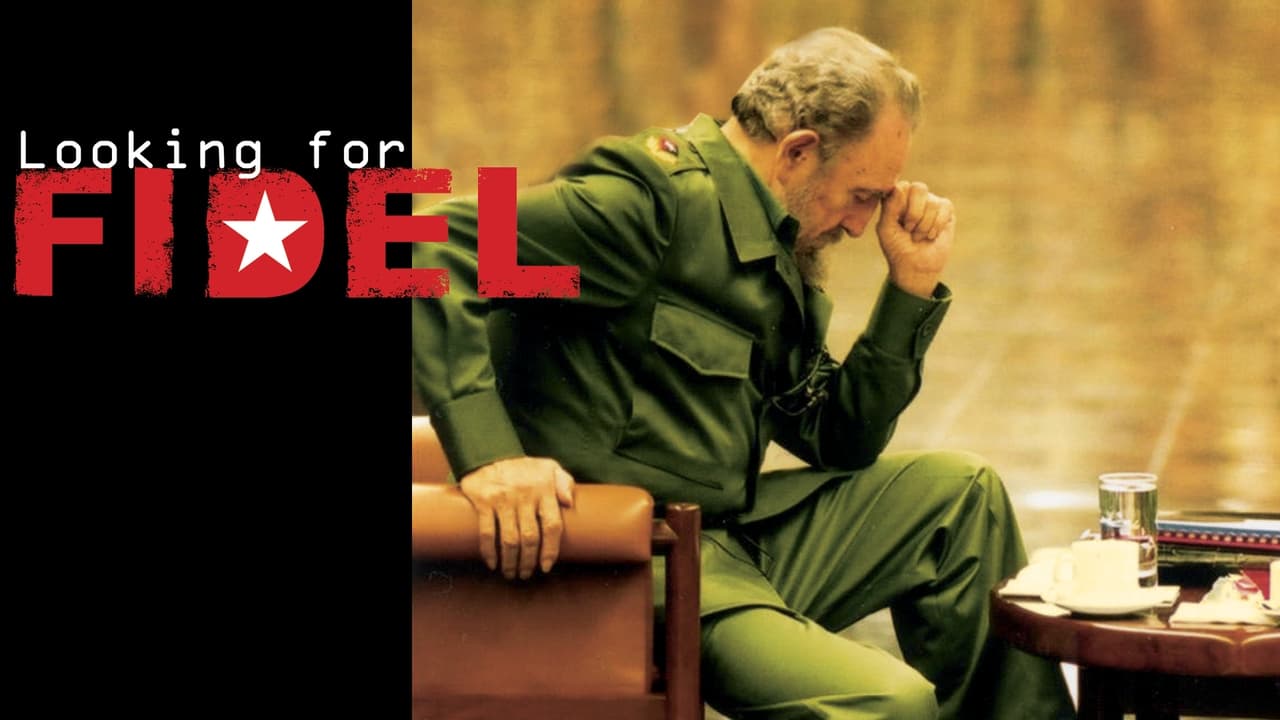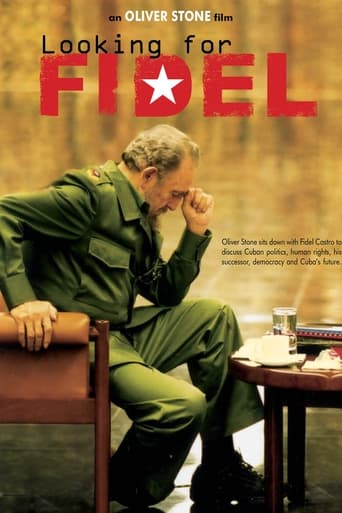Dorathen
Better Late Then Never
Melanie Bouvet
The movie's not perfect, but it sticks the landing of its message. It was engaging - thrilling at times - and I personally thought it was a great time.
Lidia Draper
Great example of an old-fashioned, pure-at-heart escapist event movie that doesn't pretend to be anything that it's not and has boat loads of fun being its own ludicrous self.
Staci Frederick
Blistering performances.
jotix100
"Looking for Fidel", by Oliver Stone was made after his other documentary about Castro, "Comandante", showed a more favorable picture of the situation in Cuba. This 2004 film gives us an Oliver Stone asking questions he didn't ask in his previous conversations with the old dictator.In the documentary one sees an aging figure explaining things that happened after the hijacking of a couple of Cuban aircraft to Florida. Then came the massive jailing of seventy five journalists and political dissidents and the killing of three young black men who commandeered a passenger ferry in which a couple of tourists were the unwilling victims of their attempt to leave the country.It's ironic to watch the jailed hijackers being asked by Mr. Castro as to what they think would be a fair punishment and one responds maybe twenty years in jail. Mr. Stone offers he would have asked for only five, but the reality is most of them got life terms. Call it justice Cuban style!Mr. Castro with his usual facility defends his actions as justified. The journalists and dissidents, he claims, are paid by the US government, which he and his regime have maintained all along, so there's nothing new in what he reveals. The confrontation with the would be air pirates show us ten men desperate to leave Cuba for a different kind of life and the myth of the American dream.The final section of the documentary seems staged. When Mr. Castro comes to a crowd in a Havana block, his fans shout to the camera about how children are being educated, and how they now have computers. Well, knowing full well they can't use those computers to get into a free Internet clearly shows the young woman knows nothing about the subject.The documentary, while trying to be informative, shows a man at the end of his life who sill has a great ego and doesn't want to let go of the control he has over everything in his homeland and is not willing to give up.
bfan
I found this documentary interesting, but it could have been SO much better. The main problem was the style in which it was taped. Even simple exchanges between Oliver Stone and Fidel Castro were taped with four or five cameras, two of which were hand held and none of which ever stopped moving -- panning back and forth, zooming in and out -- in a sort of MTV-documentary style. It was horribly distracting. Another problem was Stone, who spent much of the time sifting through reams of notes in an attempt to seem prepared. A very amateurish way of interviewing someone. Overall, this documentary is more flash than substance, like most of Stone's movies.
nothing_important
You'll know what I mean once you've seen the doc. The level of professionalism is ratcheted up to something akin to 60 Minutes over, say, typical documentary fare like Hidden in Plain Sight, which I have reviewed. There is no narration, although factoids appear a few times. And the interpreter is fairly impressive. I think I'd like the DVD if it had additional footage, which is inevitable here I think. If you have seen Buena Vista Social Club, you already have a feel for Cuba, which many Americans may not. I already knew that, for instance, Cuba's literacy rate is one of the best in the world. They generally do not suffer for lack of food either. The film makes references to the Cuban 5 and the Cuban international trade scenario. I suppose I will research further because the intent is to focus on Fidel here and it does that admirably. I felt like it dragged a little about 3o-45 minutes in, but Fidel's passion and struggle in having to face compromises in his wish to hold to certain revolutionary principles is more than charming. Small states are traditionally virtuous because they are weaker, and vice versa for big states, a point Castro manages to put in context without using it as a crutch. Watch for the shot of Che at the end, a startling likeness to Benicio Del Toro, who has looked like many.
Aaron Muchelle
I watched "Looking for Fidel" on HBO tonight, and thought that 'Comandante' was better done. Although 'Comandante' had less questions about dissidents, it gave you far more insight in to the way Castro thinks, than 'Looking for Fidel" does.In this short-film, Castro is grilled specifically on dissidents, and the moment of truth comes earlier on, when questioned on the 'closed trials' and why Castro did not allow the prisoners to see their families, Castro, in his unique orator voice asked of Stone, "Why is it that over 800 prisoners held by the United States at Guantanamo Bay have not been allowed to see their families for over two years?"If you have watched 'Comandante' and liked it, you are sure to enjoy this low key one-on-one.

